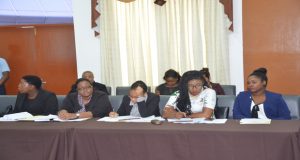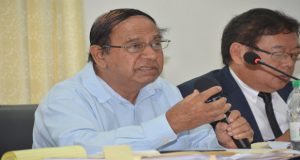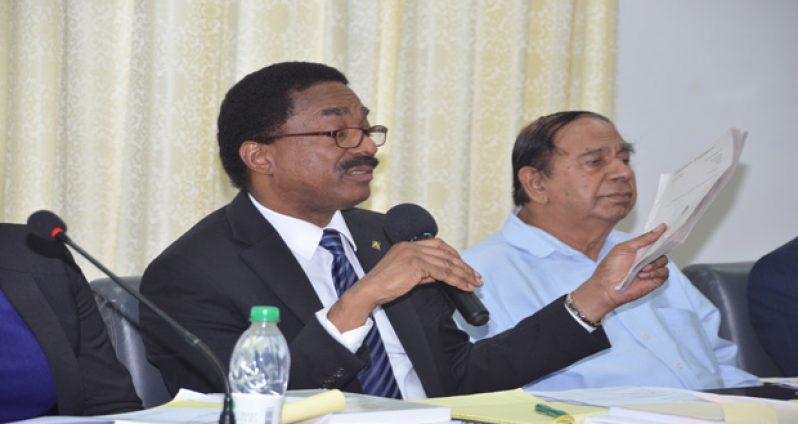THE Anti-Terrorism and Terrorist Related Activities Bill 2015 received the full support of the Private Sector Commission (PSC), the Guyana Bar Association, and the Banking Sector, when a public consultation was held yesterday.The consultation was held at the Arthur Chung Convention Centre, in light of major criticisms, but the main critics – the People’s Progressive Party/Civic (PPP/C) and the Guyana Human Rights Association (GHRA) – were no-shows. The 107-page Bill outlines clear penalties for persons engaged in terrorism and terrorist related activities. When enacted, anyone found guilty of committing a terrorist act will be sentenced to death, if such act has resulted in the death of any person.

However, if there are no casualties, that person will be punished with a fine of not less than $500,000 or more than $3M together with imprisonment for not less than 10 years or more than 15 years.
During the consultation, Attorney General and Legal Affairs Minister, Basil Williams explained that the Anti-Terrorism and Terrorist Related Activities Bill 2015 contained two clauses that were developed from the Vienna Convention, the International Convention for the Suppression of Financing of Terrorism 1999 and the Palermo Convention, in keeping with Recommendation 35, which was handed down to Guyana by the Financial Action Task Force (FATF).
In the Caribbean Financial Action Task Force (CFATF) 2011 Mutual Evaluation Report on Guyana, this deficiency in the country’s Laws was highlighted, hence, since then, CFATF and FATF have been urging Guyana to implement Recommendation 35.
Although moving to pass the Anti-Money Laundering and Countering the Financing of Terrorism Amendment Bills, the Government, through the Attorney General, was informed by the Financial Intelligence Unit (FIU) that the passage of Anti-Terrorism and Terrorist Related Activities Bill was necessary to bring Guyana in total compliance with FATF requirements.
Come January 12, 2016 the Attorney General will engage in a face-to-face meeting with the Americas Regional Review Group (ARRG) in Panama, and according to him, it is critical for the bill to be enacted ahead of the meeting.
“FATF and CFATF could do serious damage to any economy, whether you like it or not, if they decide that you are creating problems in the international financial system by not implementing their recommendations, which will really prevent money laundering and financing of terrorism, they could do you damage,” the Attorney General warned.
Though highlighting that the PSC was given 116 hours to analyse the Anti-Terrorism and Terrorist Related Activities Bill, the Chairman, Retired Major General Norman McLean stated clearly that the Commission was in support of the Bill.
“The question was asked, why the rush…but we now understand that there seems to be some deadline, which we are supposed to meet and we want to make it clear, that we want to work with the Government to satisfy those requirements,” McLean said.

Members from civil society used the opportunity to query whether protesters, who would often engage in the blocking of public roads, would be viewed as terrorists, taking into consideration that the bill alludes to the disruption of public safety including transportation and other essential infrastructure. AG responded in the negative.
Member of the Private Sector Gerry Gouveia, was among those who questioned the origin of the bill. “The format of this bill, the wording of this bill, was this handed to us…was this bill drafted in Guyana at our discretion or was it handed to us by FATF or CFATF?”
In response, the Chief Parliamentary Counsel Cecil Durjohn explained that the Anti-Terrorism and Terrorist Related Activities Bill was developed using a draft from Jamaica.
“We took a draft from Jamaica; now we are not tied down to follow any particular provision. We modified the bill to meet the Guyana situation…and this is the way we do our work, if we have a precedent in any part of the Commonwealth on something of a complex nature, we normally take it, study it, discuss it with our colleagues, and try to prepare a draft of our own, so it can be truly said that this is Guyana’s bill.
Although, the Guyana Human Rights Association failed to make an appearance, the Attorney General, with assistance from the Chief Parliamentary Counsel, used the opportunity to address some of their concerns.
Over 30 amendments and recommendations were made to the Attorney General; however, none was included in the draft legislation.
Additionally, the GHRA recommended that “Guyana could set an important precedent by inserting in the law a section providing for the establishment of ‘an Advisory Committee on Human Rights and Terrorism’.”
Such a committee, the GHRA believes, would advise on the implementation of the eventual Act, and could be led by a senior judge including, among others, representatives from civil society.
By Svetlana Marshall



.jpg)










